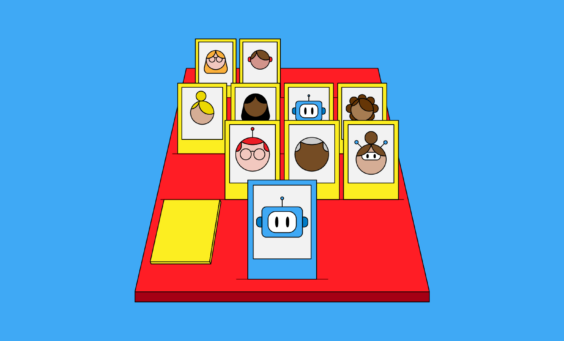Update March 2023. This article was written when ChatGPT was still in its early stages and Google was yet to unveil Bard. Both of these technologies have since been launched or, in the case of ChatGPT, updated and both are ever-evolving. Learn more about AI in local search.
The year is 2023. A robot skeleton is walking across an apocalyptic wasteland. It turns to you, and while you quake in fear, its eyes glow red and it points a finger in your direction. Its mouth opens and…
It drops a battle rap about local SEO, with some sick bars.
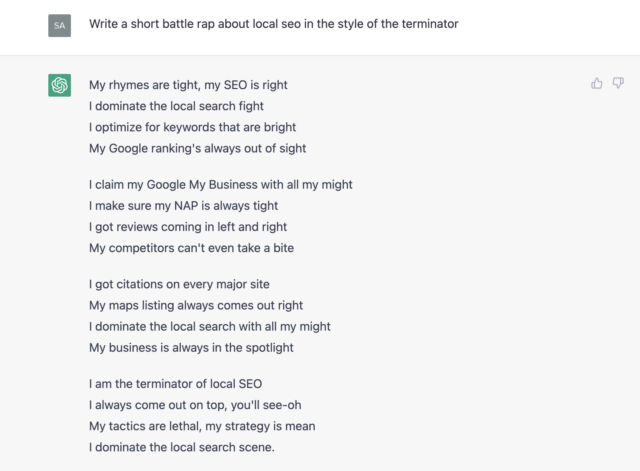
So, er, while the early forays into AI aren’t exactly what everyone imagined them to be in movies, AI is most certainly advancing at an astonishing pace. The above screenshot from OpenAI’s ChatGPT is solid evidence of this. The question is not really a ‘what if’ but more of a ‘how can I use this to improve my work?’, and a lot of marketers are already doing just that.
What do we mean here by AI?
The term AI (meaning ‘Artificial Intelligence’) has been bandied about for decades and has evolved to loosely define a number of separate things, all the way from the killer machines depicted in the example above right over to the way modern TVs can intelligently “fill in” the pixels of low frame-rate or low-definition content to create a smoother effect.
The current conversation, however, is really focused on how the emergence and popularity of AIs known as ‘language models‘ will likely impact the way we marketers work, and whether this will have a similar impact to the industrial revolution.
You might have played around with chatbots that attempt to emulate human speech and conversation before, and while those are notable, they don’t come close to the level of accuracy we’re seeing when inputting commands into a tool like ChatGPT.
The use case has become less “let me feel like I’m talking to a human with a distinct personality” and more “respond to a command with what I’ve asked for”, although a manufactured personality (as we’ll see below) still plays a big part in what makes language models useful to marketers.
In summary: while there are dozens of ways AI can be used and talked about, in this article we’ll be focusing on conversational, command-receiving language models, and ChatGPT in particular.
Now we’re in a position where AI is readily available in the marketing and SEO industry, we want to see how it can help or hinder, and how it’s already being used by thousands of people.
AI and SEO
There are a number of reasons why the conversation around AI has become so prevalent in SEO. First of all, ChatGPT is owned by OpenAI, who are in partnership with Microsoft thanks to heavy investment by the tech leader, and there’s already talk about what that means for Bing.
Secondly, there’s been conversation about what services like ChatGPT mean for search in general. For instance, if you can ask AI a question and it gives you the answer, then what does that mean for search engines themselves and informational queries? If someone can ask it a question and not have to click through several different links, then what does that mean for informational searches? Is this the return to the “answer engine” as many predicted back in the day?

And then, finally, there’s the automation aspect. In search, this takes on a few different faces. These automations can save marketers hundreds or even thousands of dollars, as well as plenty of time and the cost savings that come with that.
Where is AI already being used?
The truth is that search marketers have been using forms of AI for years, it’s just ramped up with recent updates. Sure, ChatGPT has brought the conversation to the forefront, but there’s a bunch of other software that already uses AI. A few examples of where it’s already been used, specifically in search, include:
- Autocomplete and writing support. Google has had an autocomplete functionality for years, whether that’s in the search bar, Gmail or Google Docs. This uses AI and machine learning to guess what you want to write next. Not only that but all sorts of tools from Grammarly to Hemingway support writers by improving their copy.
- Google Vision. This is a pre-trained machine-learning model that allows developers to assign labels to images. This helps improve Google image search by identifying things within images like text and objects.
- Search algorithms themselves. It’s pretty safe to say that Google, and other search engines, have been using AI and machine learning in their algorithms for several years now, for both text and voice search.
- Spammy content creation. There have been reports of major sites using AI to make content, and sometimes the reaction has not been good, especially when the AI has extensively plagiarised other work. In reality, content farms have been creating spammy content for a long time; AI simply allows anyone like this, for whom cost trumps quality, to make massive cost savings in the labor department.
There are a number of other ways AI has been used specifically by marketers, though, and we’re going to touch on that a little later in this article.
Pros and Cons of AI in Search
| Pros | Cons |
|---|---|
| Allows automation of repetitive tasks | Quality can be an issue |
| Allows large tasks to be completed faster | Brand voice can get lost |
| Can offer inspiration | Harder to be unique |
| Exciting opportunity to use "futuristic" technology | Legal copyright issues and ethical questions around replacing human workers |
| Pretty much free (currently, anyway) | ChatGPT is likely going to cost money in the future |
| Can add surprising creativity to content | Google is against AI generated content |
| Huge variety of uses | Some models based on old data sets, resulting in "knowledge cut-off" |
Potential Uses for AI in Local SEO
As we’ve already established, search marketers are already using AI, but what they do and how they do it is evolving.
Are you already using AI for your local SEO activity?
What are you using it for? Let us know in the replies. 👇
(And no, we don't just mean using Chat GPT to write humorous poems) 🤫
— BrightLocal 🇺🇦 (@brightlocal) January 6, 2023
But how are local businesses and local marketers using AI? Sure, everyone’s had an infuriating conversation with a chatbot that goes round and round in circles, but how are people using them specifically to do the jobs that help their visibility?
Let’s dive into just a few potential uses for AI in your local marketing.
AI for Content
One of the biggest uses for AI that’s often talked about is content creation. Many people are divided on this, but it’s still being used for each of the following tasks every day.
Writing Blog Posts
You know it’s happening. Whether it’s right or not is another issue. There are a lot of ethical considerations to be made, and while you’re unlikely to get something truly unique, many people will be doing this to generate content quickly.
The simple truth is that people already outsource huge amounts of content to cheap content farms, so if they can speed up the creation of spammy content, they’re going to do it. If you choose to do this, just be very careful. Google is investing in spotting AI content, remember? And, as you’ll see below, industry experts advise a great deal of caution when using ChatGPT for content.
Creating Scalable Content for Multiple Local Landing Pages
On the flip side of this, if you’re creating content for a huge number of location pages, AI like ChatGPT could be a quick way to make content for these without having to do extensive research.
You’d still need to take steps to differentiate your local landing pages, but automating a section could save you a whole lot of time when you’re creating large numbers of pages at scale. The below, with a few simple edits, could form the basis of one page. Then, with a few other prompts, it could let you create content at scale for multiple landing pages that only need a few additional things to make them truly unique.
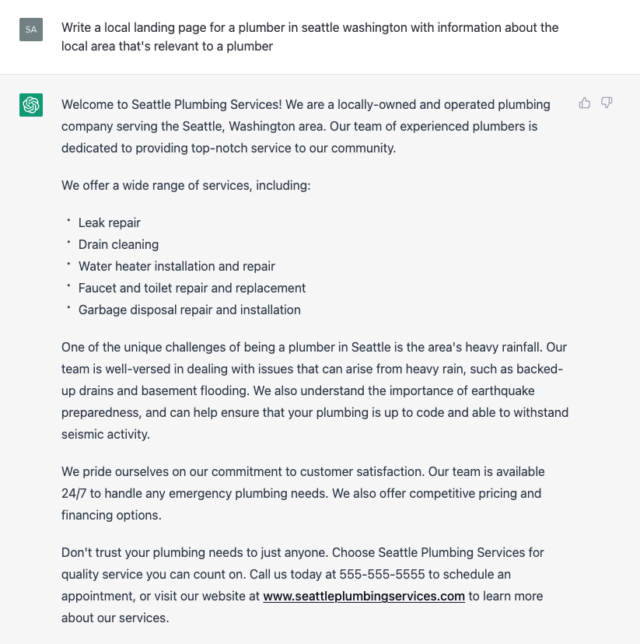
Writing Simple ‘How To’ Content
Brands across the world spend many hours a year writing simple ‘how to’ content. Some of these brands will see something like AI as a real time-saver. As always, though, the question is whether the pieces will always be accurate, and how much time you’d need to spend tweaking them.
Creating Article Outlines
A more sensible approach that many are already using is consulting AI tools for article structures. This is better because you’re using the tool for inspiration rather than relying on its at-times-questionable ability to churn out accurate content.
Give the AI some keywords or prompts and it can spit out a proposed structure of headings and subheadings, much like Jasper’s Blog Post Outline feature, seen below.
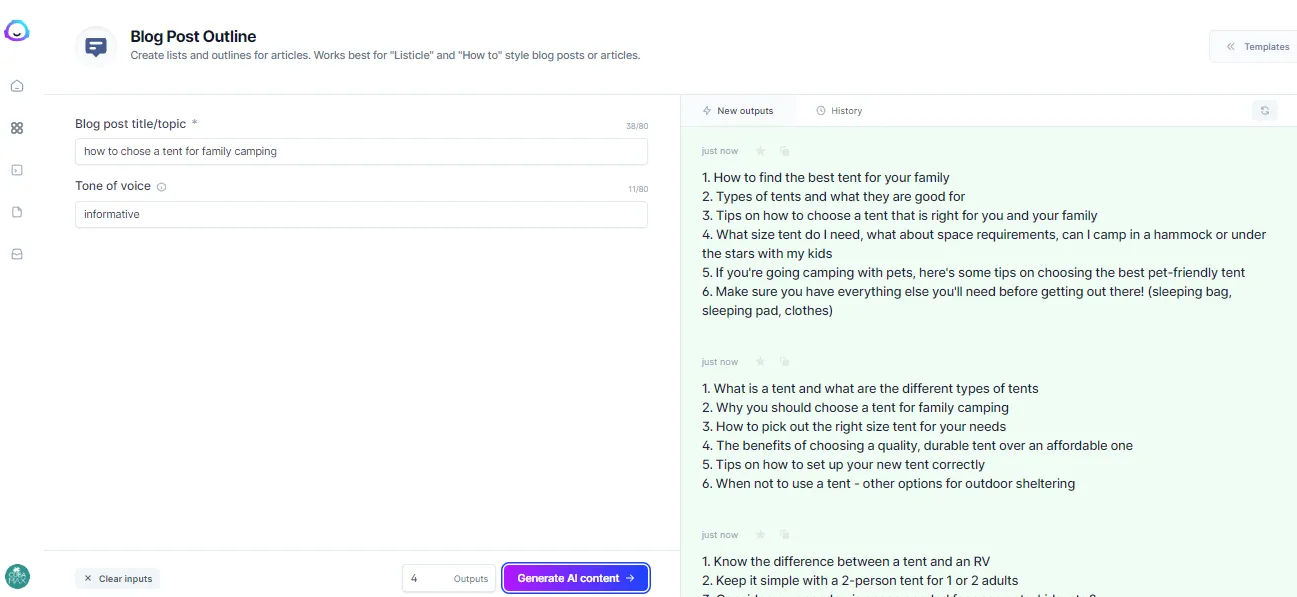
Source: Medium
Ideas for Headlines or Email Subject Lines
Crafting the perfect headline or subject line is an art. AI, when given the right prompts, can spit out a bunch of different ideas for your piece that you may not have thought of yourself. At the very least they can be a kickoff point.
Ideas for Local Content
Inspiration is key here. If you have a subject or topic but aren’t sure what to write, you can simply ask. This is the kind of automation that could help busy content writers, or people without a team to bounce ideas off, to generate a variety of different things to write about.
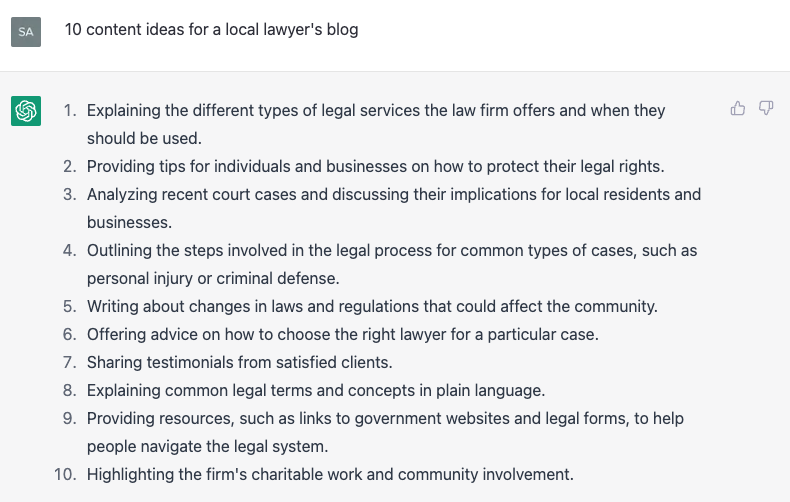
FAQs
Along with metadata, creating FAQs is a least-favorite task for many a content writer. It’s something that feels like it saps the creativity out of you. Now, with a few simple prompts, you can get a list of FAQs for pretty much any page. Then, if you’re feeling brave, you could even get the AI to write the answers for you!
Metadata
Another task that can feel endless when you’re doing it at scale, writing metadata should be done with care to try and help your click-through rate, but when you’re doing it en masse, AI like ChatGPT could be a real help. You can even set parameters for length and tone in the prompts, too!
AI for Research and Insights
Quick Local Keyword Research
ChatGPT and other AI platforms open up all sorts of new handy ways to perform localized keyword research:
- Discovering ‘near me’ keywords
- Finding how people are searching for a particular service, in a particular area
- Refining the intent behind a particular search, with tools like KeywordInsights.ai
Strategy Development
It’s safe to say that this one should be taken with a pinch of salt. I wouldn’t base your entire strategy on something ChatGPT gives you in 5 seconds, but it could offer some inspiration if you’re struggling to get started.
Automation for Regular Local SEO tasks
Writing a Google Business Profile Description
Look, writing isn’t for everyone, and your Google Business Profile will need some copy. If you’re stuck for a way to describe your own business, or that of your client, then AI can help. A number of local SEOs have commented on their surprise at the quality of the GBP descriptions they’ve seen come from AI.
As ever, though, you’ll probably need to add a few things to make it properly personal, as you probably know more about your own business than the bots do (for now).
Generate Local Schema Markup
Yes, you read that right: you can even use AI to generate schema for your website. All the different kinds. While this may sound great, it’s also not necessarily any more powerful than a standard schema generator, and you’re probably more likely to have to triple-check it.
Much like generating website code with AI, this option is best used by people who already know what good, accurate schema looks like!
Responding to Reviews
Whether or not you respond to reviews can play a big part in how much consumers trust businesses. However, if you’re doing particularly well at review generation, you might have far too many to deal with.
As Steady Demand’s Ben Fisher explained in our State of Local Search 2023 webinar, you can prompt ChatGPT to write detailed review responses for you—as always, though, be careful to check and edit before posting.
Creating a Site Structure for Local Content
If you’re not sure of the best way to lay out a section of your site, AI can help here, too. With the right prompts and questions, you could ask it to help with your services or even local content.
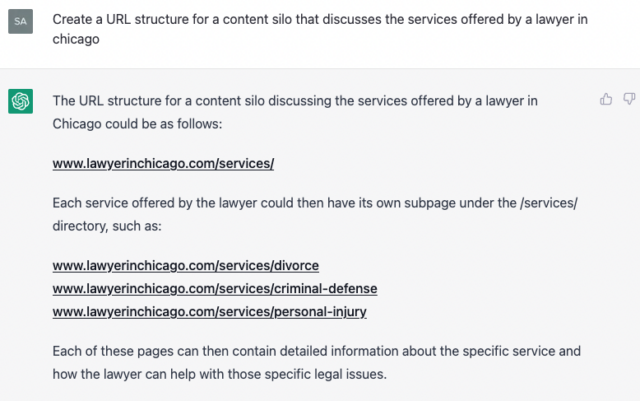
AI for Art and Design
It’s a cliché that a picture paints a thousand words, but in the world of prompt-based AI image generators, the opposite is finally true.
With tools like Midjourney, Stable Diffusion, Lensa AI and DALL-E now mostly available to the public and more advanced than ever before, anyone and their dog can create professional-looking images quickly and (sometimes) completely free.
For example, we created the image of our in-house AI, Randall Bott, using the simple prompt “40-year old male SEO expert in plaid shirt, headshot, professional lighting” on the Midjourney Discord server (yes, we leant heavily into the SEO stereotype, there).

Beyond the dizzying array of AI artists creating fictional and creative worlds (some, artists embracing new technology, and some, less visually-artistic people creating images for the first time), there are many using AI image generators to create uncannily photorealistic images in order to illustrate their content.
There are plenty of potential uses for AI image generators in local SEO, including:
- Blog post headers
- Location page “photos”
- Website backgrounds
- Inspiration for logos
However… due to the nature of visual art, in that it is immediate (and therefore immediately recognizable), the conversation around the ethics of these image generators is a far more heated one. Firstly, there’s an inherent bias towards non-minoritized people, due to the AI’s source material being skewed by images of white people. Then there’s the issue of copyright: who owns the copyright of these images when they’re based on, well, everything?
While some argue that AI art always creates completely new variants and mutations, there are plenty of examples (like the one below) of platforms clearly leaning into well-known imagery in its datasets:
The images below aren’t @McCurryStudios “Afghan Girl”.
They are AI generated images via Midjourney’s latest V4 release. Yet another example that AI models can *heavily* plagiarize. pic.twitter.com/XeeKqwsyrs
— Karla Ortiz (@kortizart) November 5, 2022
The short and skinny of AI art for local marketers: You can go ahead and use it to generate images if you like, but be prepared to have tough conversations around ethics, copyright, and more. You’ll need to decide for yourself whether it’s worth the potential backlash, which is admittedly a greater risk when working with larger brands.
Other SEO Tasks That You Could Automate
- XML sitemaps
- Creating a robots.txt
- Generating breadcrumbs
There are likely a whole lot more! Want to add yours? Send us a tweet with your suggestion!
Tips for Generating the Best Prompts
As you may have guessed, to get the most out of AI like ChatGPT, it’s all about getting the prompts right.
Andrew Shotland from Local SEO Guide has given us a few tips for doing just that:
“When you are crafting prompts, try to be as specific as possible while also asking for small chunks of outputted copy vs. asking for a long-form response. This ensures you will get a higher-quality response and less repetitive text that will need to be edited.”
If you need some more inspiration, check out this excellent collection of ChatGPT prompts.
What do local marketers think of AI?
With subjects like this, it’s always good to get another opinion. Local SEO is a wider world than you may think, so we asked a few industry experts for their thoughts.
When you are using AI to produce local content, there are a few considerations to make for your approach: 1) What data do you use to create prompts? 2) What’s your method for refinement and editing? 3) How do you test your AI content?
AI shines when it’s being used to speed up the scale of content production with templates that have a find-and-replace type of copy for different versions (e.g, location pages). Ideally, you would use AI to make these kinds of repetitive pages more unique, as this can have an impact on their indexation and ranking.
At Local SEO Guide, our process includes code for fact-checking, fine-tuning, and avoiding plagiarism. We start with content written by people and then fold that into data we have about the location, subject, and so on. Through some careful editing and having checks in place, we make sure our content is good and original, and simultaneously avoid repetitive work.
Like Terminator 2, amazing results can happen when humans and machines team up against SkyNet.
I have a few thoughts on ChatGPT/OpenAI and how content marketers could (and should) be using it now.
If anyone doubts AI is part of the future of SEO and content marketing, I don’t know how to convince them otherwise. So many are running around like chickens with their heads cut off, worried about the impact of AI-written content on our jobs and work. However, low-quality content has always been in our space; it’s always ranked, and it’s always found its way to the top until Google catches up, and it’s not there anymore.
This is the nature of our work as SEOs and content marketers with search engines. Something new comes along and knocks us around—then we find a way to use it to our advantage, for better or worse. Search engines do the same.
Where ChatGPT and OpenAI-based content platforms are going to succeed is with the guidance of content marketers and SEOs like us to build on the foundation of AI-generated content starts as. Anybody publishing the first draft of what they’ve written on the internet is lying to you—or shouldn’t be writing in the first place.
This is work we should already be doing to help ourselves, and our clients, create the best possible content. We’re just now going to be using ChatGPT as our “first draft.” From there, the possibilities are endless: where we take that content, how we add to it, or even how we leverage AI to help us create more around a given topic. With feedback from subject matter experts and our clients, we can create something unique from something that starts out as a diamond in the rough.
The following three quotes come from the section on AI and ChatGPT from our live webinar on The State of Local Search 2023.
We need to tread very carefully. We need to understand the impact on our workflows. … Google, historically, had a huge spam department. They’re … probably looking at this with a fine-tooth comb right now. They’re tweaking their algorithms, they’re feeding the machine and they’re basically coming back and saying ‘okay, what kind of heuristics can we create to test and filter’.
There’s been some conversations in the back rooms with Google … They’re going to get good at this. Be really careful, don’t be too overzealous.
I see ChatGPT as an unreliable intern. ChatGPT … is a stepping block to make tools or things to make your job easier, but it should not be what you depend upon and rely upon for your final answer. If you’re depending on ChatGPT to give you any output and you’re just copying and pasting that, you’re gonna have a bad time. Even when it does things like schema, it’s not exactly correct. It has issues with it and you have to fix it.
It’s a tool to help you do your job better and faster and pick up where it might be difficult. Sometimes it’s hard to figure out how to put the words ‘near me’ into content naturally … and it’ll do that, and probably do that faster than I could do it. The one tip I saw … was asking the AI to make something NLP friendly. That was really fascinating. What came back was very different to how I would have worded it. So using “semantically friendly”, “NLP format”, those kinds of prompts can really give you insight into “oh, maybe I should reword it like this.”
I do not suggest using it to spin out 50 pages of content without editing. But keep in mind that that’s not new … SEOs have been doing that for decades.
Things to Consider
When it comes to AI there are a few things you need to consider before you dive in and start using it for absolutely everything like a crazy person.
The Database for ChatGPT Has a ‘Knowledge Cut-off’
This means it only knows things up to a certain point in time (2021, to be exact). Therefore new products, changes in laws, or other updates just won’t be something it answers. In some instances, it even suggests using traditional search engines for a query instead.
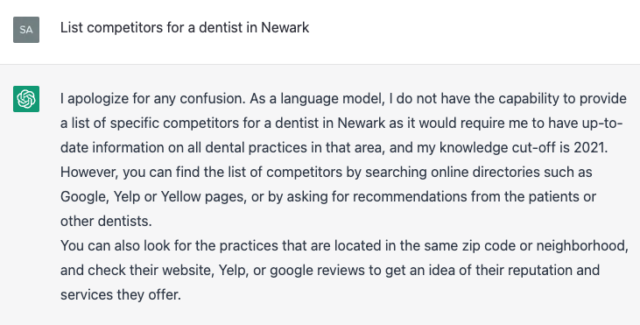
Double-or-triple-check Everything
It’s one thing if the out-of-date knowledge gives you bad information in content, but if you’re using it to generate code or create markup, you need to be very careful, especially as language models can do what is known as ‘hallucinate’ and spit out complete falsehoods when it doesn’t understand the prompt.
The time it takes you to check over it may not save you as much time as you think, and in some cases, you may only spot an issue if you happen to be well-versed in the topic already.
Miriam Ellis, of Moz, touched on a number of times ChatGPT was just flat-out wrong when she gave it a try recently.
Be Careful with Tone and Personality
If you ask a basic ‘please write me something on [subject]’ prompt, you’re going to get something that’s (probably) factually correct, but lacking any kind of personality.

There are ways around this, sure, like you can ask it to write in a particular style or voice. But it’s unlikely that you’ll be able to get it to speak in your brand tone of voice without major edits. AI content is functional, but you’ll struggle to rely on it when you’re building a brand. Even the stuff with a bit more ‘personality’ isn’t always great:

Things Could Get Tricky, Legally
As you can probably tell from the tone of this piece, we’re not here to expressly endorse using AI for all your tasks. We believe AI has the power to make mundane jobs more fun and hard jobs easier, but we’re also keenly aware that, as with any emerging technology, the legal ramifications (particularly around copyright) will only be truly understood once the waters have been tested via landmark court cases.
As such, there have already been a number of concerns about plagiarism and even a lawsuit directed at AI ‘art’. Things are still in their early days, and as AI uses existing content from around the internet to develop its knowledge, there’s a chance things could get murky in the future. For example, there’s already talk of a digital watermark being created to help identify AI content.
If this is a particular concern for you, the tool Originality.ai comes recommended as a plagiarism checker.
Google Has… Opinions… About AI Content
It’s not even a new subject for them. Historically, they’ve said it goes against their guidelines. Obviously, they have to identify that content first, but based on the potential of a watermark, and the fact that a number of people are already working on software to identify AI content, I think we can probably trust that Google isn’t too far off it. These are the folks, remember, that built an AI that one developer genuinely believed was sentient.
Final Thoughts: There’s Opportunity, but Be Careful
AI offers some really exciting opportunities for local marketers. Whether it’s speeding up your boring tasks, offering inspiration, or simply just a new outlet for creativity, there’s something it can help you with.
While that’s the case, though, you need to be extremely careful how you’re using it. If you’re generating anything technical, like code or markup, you’ll need to create new processes for checking accuracy.
Meanwhile, if you’re using it to generate content, you need to make sure you’re properly reviewing it to make sure it’s unique. There have already been issues with some AI-generated content and plagiarism. Running it through a plagiarism checker like Grammarly is a start, but uniqueness isn’t simply about the order of words. You need to make sure that you’re bringing true personality and expertise to the table.
Google’s E-E-A-T (Experience, Expertise, Authority, and Trust) parameters are more crucial than ever, especially since the rollout of the Helpful Content Update. So if you are truly keen to use AI, make sure you’re ready to make changes to the content. You’ll also need to be wary of those digital watermarks mentioned above.
Finally, it’s worth noting that, thanks to the widespread access to the legitimate phenomenon that is ChatGPT, this conversation is just getting started. We had to revise, redraft and expand on this piece multiple times to react to the AI news pieces that flew into our inboxes at gatling-gun pace.
But because it’s new, and because it’s fast-moving, it’s naturally exciting. That doesn’t mean you should abandon your tried-and-tested local SEO strategy just to play with the shiny new thing. Baby and bathwater, and all that…
Have you used AI to create content for local SEO? How did it go? Let us know on Twitter or continue the conversation with like-minded local SEOs in BrightLocal’s Facebook community, The Local Pack.
